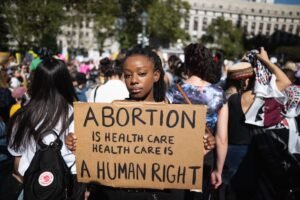The North Carolina Supreme Court has temporarily halted the certification of Democratic Justice Allison Riggs’ apparent victory in the state Supreme Court race, igniting backlash from voting rights advocates and Democratic lawmakers. The court’s decision, handed down on Tuesday in a 4-2 order by its GOP majority, will allow it to hear Republican challenger Jefferson Griffin’s case, which seeks to discard over 60,000 votes.
The Controversy
Griffin, who lost to Riggs by 734 votes after two recounts, is challenging ballots over alleged voter registration issues, claiming some voters had incomplete registration records, such as missing Social Security numbers or driver’s license details. Critics argue these claims lack merit, noting that such issues are typically addressed well before election day.
Democratic lawmakers and nonpartisan voting groups have denounced Griffin’s efforts as an attempt to overturn a legitimate election. “Judge Griffin’s challenge is a direct attack on over 60,000 legal voters,” said Embry Owens, spokesperson for Riggs’ campaign.
Nicole Quick of Carolina Forward called the court’s decision “terrifying,” emphasizing the potential to erode public trust in the judicial system. Democratic State Rep. Pricey Harrison added, “This is a clear case of the fox guarding the henhouse. Griffin’s attempts to change the rules after losing does not change the fact that these voters followed the law.”
Political Fallout
The dispute has intensified partisan tensions in the state. DNC Chair Jaime Harrison condemned the decision as a “craven attack on North Carolina voters” and “an affront to democracy.” The case has also raised ethical concerns, as the justices temporarily blocked certification in a race that determines their own court’s composition.
Riggs, who recused herself from the matter, has appealed to the Fourth U.S. Circuit Court of Appeals, urging an expedited review. A federal judge recently remanded the case back to the state Supreme Court after the State Board of Elections initially rejected Griffin’s challenge.
Implications for Future Elections
Voting rights advocates warn that if the court sides with Griffin, it could set a dangerous precedent. “Allowing this type of post-election challenge opens the floodgates for endless litigation after every close race,” said Ann Webb of Common Cause North Carolina.
The case highlights broader concerns about election integrity and the politicization of the judiciary. As North Carolina voters watch this unfolding legal battle, the case may shape the state’s future elections and public trust in its democratic processes.
Stay informed with the Bull City Citizen for updates on this critical story and more.












